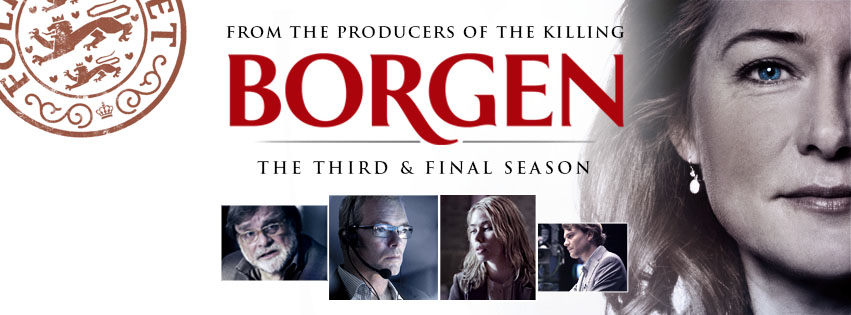I got caught up in the Danish TV Series Borgen (available on Netflix). It’s the story of Birgitte Nyborg, who becomes the Prime Minister of Denmark and how that position of power affects her personal and political life in both positive and negative ways. I tell people it’s like House of Cards, but without murder and cynicism. More like Naïve European Humanism J. In fact, I would have thought I would not like it, because I am usually bored and turned off by political preaching in movies and shows. Not only that, but this is an obvious Feminist AND Socialist narrative! But hey, I’m willing to admit great human drama and storytelling regardless of the agenda. And this is fantastic human drama and storytelling. (But beware, I did warn you)
Of course, they pretend to be “Center” in their depiction by making Birgitte a part of the “Moderates.” Though usually they are not, sometimes they actually are, such as her revelation that pulling out of Afghanistan would only worsen the violence and deaths (something our own king could learn from). One episode, they completely missed their own point when they showed the Prime Minister use private healthcare for her own daughter while hypocritically supporting their socialized system (“We don’t want to be like America”). Why? Because of the ungodly wait in line for rationed healthcare. Duh. Okay for the public, but not for us important lawmakers (I guess they are just like America after all). But she never changed her policy, and that showed that the storytellers wanted to “deal with the issue,” but never faced the consequences of their own argument.
The only thoroughly despicable person in the show, of whom it is assumed you can NEVER compromise with, is the leader of the Freedom Party, who is depicted in the worst stereotype of being a fat obnoxious pig with bad teeth. Can you guess what side the Freedom Party represents? No-brainer: The Far Right. Also, the show is very Politically Correct in that they never dealt with the raving Islamism problem in any of their episodes.
 One particularly repugnant moment of anti-Christian prejudice in the show was on an episode about two African parties at war over their country— actually, more like an Islamic party killing Christians who start to protect themselves, which is the actual scenario in Africa. Anyway, in order to make both sides have a negative aspect to them, the storytellers chose to have the Christian look all nice, but then have as his uncompromising agenda that the only ones who should not have rights in their country are homosexuals. And then he says “We have no homosexuals here” with a smile, thus revealing an oppression in denial. The tragic irony is that very statement in our real world came not from a Christian, but from Ahmadinejad, the head of an ISLAMIC country, Iran. So putting Islamic oppression into the character of a Christian is despicably dishonest and Christophobic. But that’s what you get from secular bigots.
One particularly repugnant moment of anti-Christian prejudice in the show was on an episode about two African parties at war over their country— actually, more like an Islamic party killing Christians who start to protect themselves, which is the actual scenario in Africa. Anyway, in order to make both sides have a negative aspect to them, the storytellers chose to have the Christian look all nice, but then have as his uncompromising agenda that the only ones who should not have rights in their country are homosexuals. And then he says “We have no homosexuals here” with a smile, thus revealing an oppression in denial. The tragic irony is that very statement in our real world came not from a Christian, but from Ahmadinejad, the head of an ISLAMIC country, Iran. So putting Islamic oppression into the character of a Christian is despicably dishonest and Christophobic. But that’s what you get from secular bigots.
Sorry, I had to get my rants about some of the political BS first.
The morality of the show is also very European and sadly alienating. Family is the least important of values to these people. But there is a bright shining ray of an adulterer who returns to his family, so it is not cynical. I think they were just depicting their reality, and the Danes accept it because of their godlessness. They don’t know any better, the poor secular socialists.
All that said, you might think I hate the show. But I don’t. Surprise, surprise. Why? Because the human drama and relationships are riveting with pathos. And watching Danish politics, as different from American politics as it is, is fascinating. It is well written, brilliantly cast, brilliantly acted, brilliantly directed. All human beings, regardless of their worldview leak God’s image through their work in the snippets of human truth they capture. For instance, there is a kind of moral lesson to observing the anatomy of the breakdown of a family in a tragic kind of way, even if these storytellers consider it acceptable “collateral damage” for Feminist victories and the great teat-sucking socialist state. We see Birgitte seeking to “do good” for her country, while she loses her marriage and family. In fact, the same thing happens to those in the newsroom covering the politics 24/7.
Also, there is a kind of realpolitik of compromise in that country because of their multiple parties that force them to negotiate in a way that American politics does not. Yet, even here, I found it ironic that the very thing that the politicians wanted, compromise, was NOT what the electorate wanted, because the thing that made Birgitte such a populist hero was precisely her standing out from the crowd by not playing the game and sticking to her uncompromising convictions. Hmmmmm. Maybe we’re not all that different. It’s a fair depiction of seeking to balance convictions with the reality of governing with people with whom you disagree. As Birgitte says to one of the radical Greens who challenge her, “You are the leader of the Green Party. I am the Prime Minister of a country that includes those who disagree with me.” Humans everywhere make backroom deals and negotiate for personal reasons as much as public ones.
KIND OF SPOILER ALERT: Anyway, the real reason that inspired this post was that the show is godless. God is nowhere to be found in this Danish story and their characters lives. It is quite empty. But near the very end of the last season, the heroine Birgitte discovers she may have breast cancer (Don’t worry, I won’t tell you if she does or if she does not and how it plays out).
 I just thought, that this scene of how she responds to the news was the most profound moment of the entire show, because it showed the real despair that atheist pursuers of “meaning” and “good” should really face about their delusions in light of the implications of their own worldview. It was like one spiritual glimpse behind the curtain of a very secular humanistic story. A shred of honesty in a godless world of self-deception. (I do not think the storytellers are intending a Judeo-Christian worldview in this revelation, because the whole of the show goes against it. I just think that even atheists can have a moment of honesty if they want to tell a good story).
I just thought, that this scene of how she responds to the news was the most profound moment of the entire show, because it showed the real despair that atheist pursuers of “meaning” and “good” should really face about their delusions in light of the implications of their own worldview. It was like one spiritual glimpse behind the curtain of a very secular humanistic story. A shred of honesty in a godless world of self-deception. (I do not think the storytellers are intending a Judeo-Christian worldview in this revelation, because the whole of the show goes against it. I just think that even atheists can have a moment of honesty if they want to tell a good story).
Of course, you won’t get the full impact if you haven’t lived with this character and with her victories and defeats, her gains and her losses, but I hope you can still pick it up. And don’t be fooled by vague references to prayer in the clip, that was just a colloquial blurt. It is more a metaphor for fate without a god, because there has been no spirituality the entire show.
Enjoy a rare moment of honesty from an atheist worldview…

